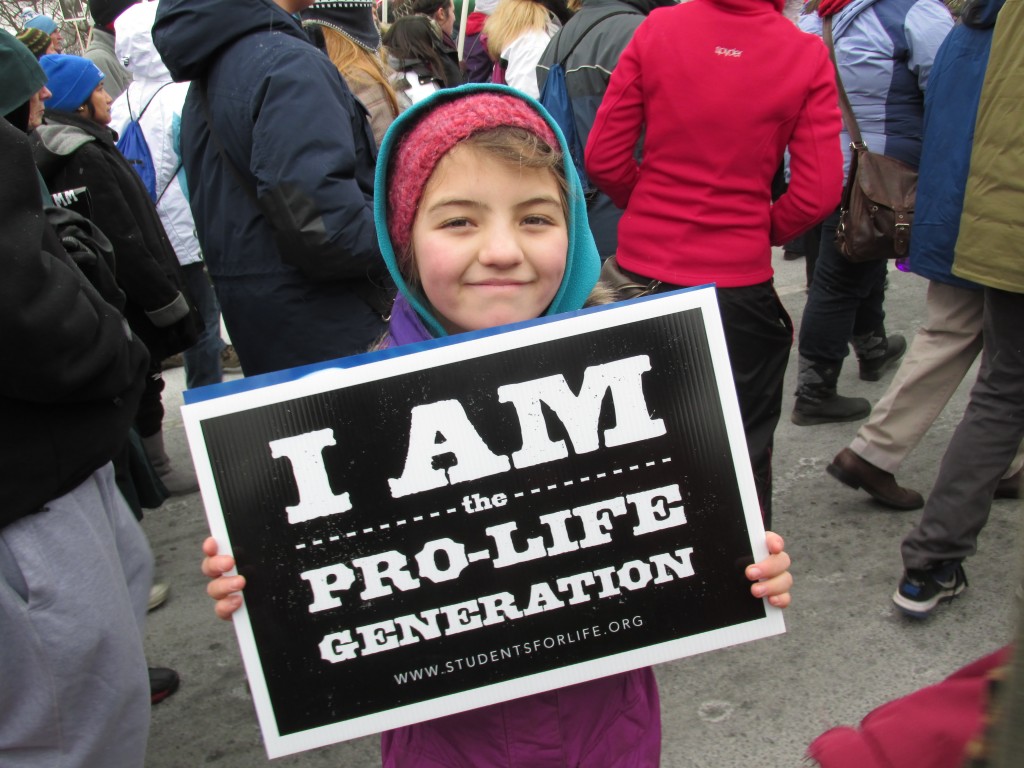This week began with Sanctity of Life Sunday, a day declared by President Reagan and observed by thousands of pro-life Americans across economic, religious, and political lines. It ends now with a seething feeling of betrayal towards congressional Republicans, freshly elected, who refused to put a bill outlawing abortion after twenty weeks of pregnancy on the floor for debate. As has been pointed out, most Americans, include a massive percentage of female voters, favor the law. Even granting President Obama’s threat to veto the bill if it reached him, the Republicans committed a grievous political error; Mollie Hemingway is right to call it a “debacle,” and David Harsanyi’s accusation of “cowardly retreat” rings true.
As much of a devastating political embarrassment as it is, the GOP’s capitulation goes deeper. It is a failure of conscience and a further signal that “conservative” is now a species of Republican, not vice versa. A miss this wide on abortion is cause not just for political clean-up but soul searching. The value of unborn life lies at the very core of conservative ideals and the basic definition of a just and free society.
For this reason, many pro-life conservatives have called themselves “Single issue voters.” They are often ridiculed as naïve, irresponsible and ideologically shallow–and that’s often from their fellow conservatives. “Single issue voter” is for some a signal that a person is unwilling to think maturely about the civic interplay between ideas and leaders. But this is an unnecessary assumption. When it comes to abortion, single-issue voters aren’t immature, they are consistently convictional.
The engine of abortion is a conviction about the non-personhood of the unborn. Though pro-choice is often eager to avoid personhood debates (and who can blame them, given modern prenatal technology’s humiliations of most of their arguments?), questions about “reproductive health” and “every child a wanted child” are actually just corollaries of fetal non-personhood, not actual cases for abortion. The only logical, legal, and moral philosophical foundation for abortion is the decision that the thing being terminated is not equal in nature or value to those deciding its fate. “What about rape and incest” is merely an end-around to get to the conclusion (“I shouldn’t have to be punished with this”) without going through the premise (“It’s not worth as much as me”).
The human personhood of the unborn is not a question isolated to one plot of social policy. If we get personhood wrong for the unborn, who else is reaping the whirlwind? A mouth-shutting 92% of all children diagnosed with Down syndrome are killed in the womb. Putting celebrities in front of TV cameras for inspirational “Make-a-Wish” specials does not a culture that values the mentally handicapped make.
What about adults? Last year Brittany Maynard was made a celebrity by media outlets for “courageously” killing herself rather than fight terminal cancer. Even if you believe that individuals should retain a legal right to end their life at their choosing, the celebratory atmosphere around Maynard’s death was deeply disturbing. Ezekiel Emanuel wrote in The Atlantic about the terrible things that await senior citizens who live too long. I read Emanuel’s article a couple days after helping my fiancé and her family move her grandmother into assisted living; after being floored by Emanuel’s naked utilitarianism, I thanked God that I have grandparents who have survived well past the time for “adventures.”
Would we celebrate Brittany Maynard’s suicide, or bemoan the perpetuity of the aged, if we didn’t have the legacy of Roe v Wade throbbing in our national consciousness? Perhaps not. But the tide seems to be turning: Polling indicates that national support for the outlawing of abortion “in all circumstances” is higher now than it has ever been since 1973. Pop culture seems to be tiring of abortion; hit films such as Juno and Knocked Up feature sympathetic lead characters that are encouraged to abort but choose life (“Obvious Child,” a pro-abortion propaganda comedy, stunk up the box office last summer despite effusive critical praise). There’s good reason to believe that pro-life is winning.
If it is, that’s all the more reason to double down in making the case for life. If the inalienable right to life doesn’t matter for millions of helpless people, then rights of liberty and the pursuit of happiness are not ideals but punchlines. The parallel drawn by President Reagan himself between abortion and slavery has never been more obvious. Pro-choice advocates sound positively antebellum when they insist that abortion is valuable since it keeps children from harsh poverty (John C. Calhoun argued for American slavery on that exact basis). It has never been more urgent in our country’s history to insist, through rhetoric and law, that life and justice transcend economics, and that legitimate prosperity is never achieved at the expense of people’s lives and consciences.
Abortion is the great civil rights challenge of our generation. Its rallying cry remains the simple placard worn by those disenfranchised marchers, “I AM a Man.” For the single issue voter, the civil rights movement is not over, it has simply not been permitted to march beyond a certain point. And as long as its values remain sequestered short of the protection of society’s most vulnerable and most voiceless, any American pretensions to liberty are transparent at best. If the GOP cannot be trusted with the greatest issue of liberty we have today, so be it, but life must and will march on.












